Review of Marlene's Mental Capacity and Legal Considerations for her Care
VerifiedAdded on 2022/12/29
|7
|1935
|50
AI Summary
This essay reviews Marlene's mental capacity and her inability to take care of herself due to various health conditions. It discusses the statutory tests for assessing her mental capacity and concludes that she lacks capacity. The essay also explains the legal process for making arrangements for her care and the additional legal considerations for accommodating her in a 24-hour residential care home.
Contribute Materials
Your contribution can guide someone’s learning journey. Share your
documents today.
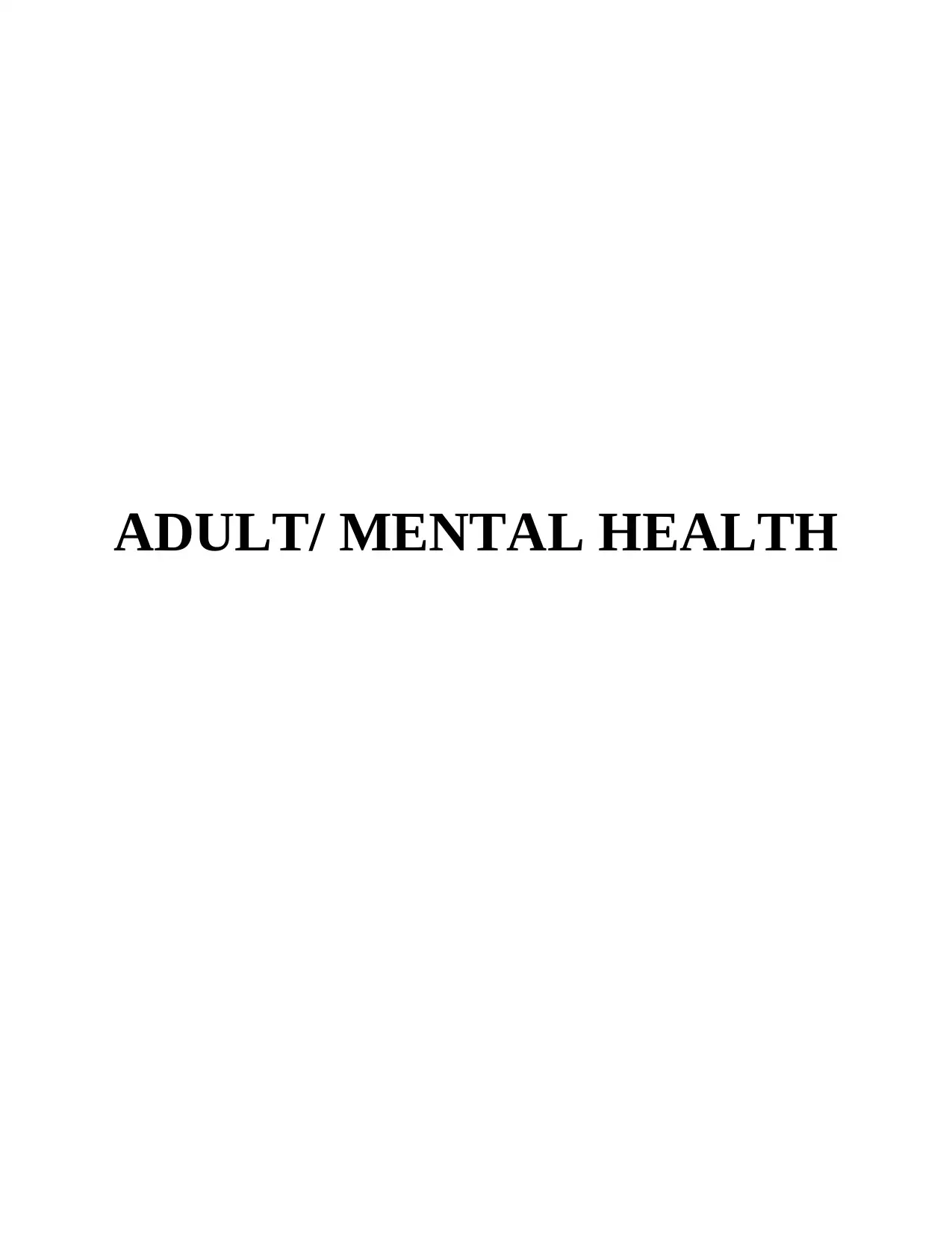
ADULT/ MENTAL HEALTH
Secure Best Marks with AI Grader
Need help grading? Try our AI Grader for instant feedback on your assignments.
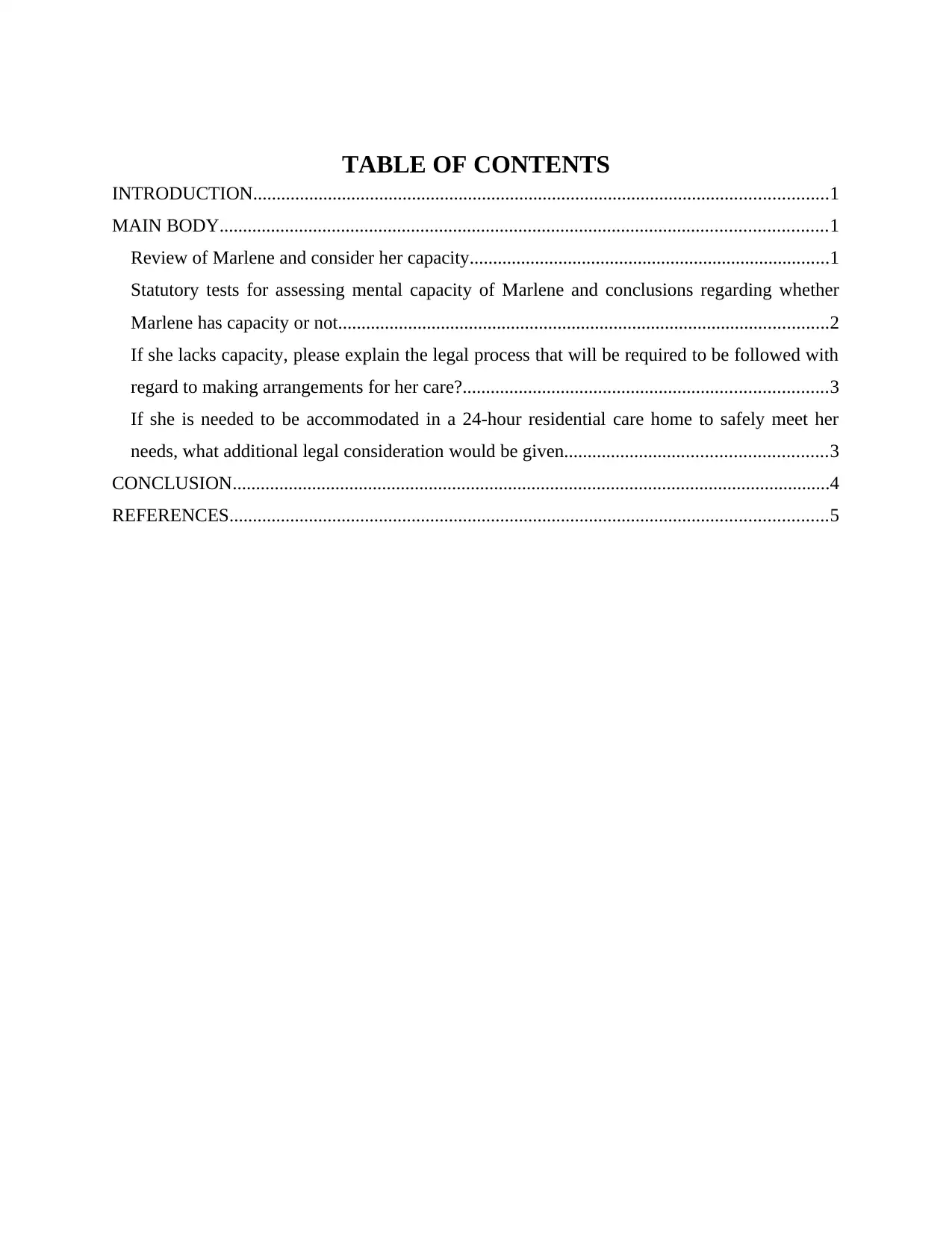
TABLE OF CONTENTS
INTRODUCTION...........................................................................................................................1
MAIN BODY..................................................................................................................................1
Review of Marlene and consider her capacity.............................................................................1
Statutory tests for assessing mental capacity of Marlene and conclusions regarding whether
Marlene has capacity or not.........................................................................................................2
If she lacks capacity, please explain the legal process that will be required to be followed with
regard to making arrangements for her care?..............................................................................3
If she is needed to be accommodated in a 24-hour residential care home to safely meet her
needs, what additional legal consideration would be given........................................................3
CONCLUSION................................................................................................................................4
REFERENCES................................................................................................................................5
INTRODUCTION...........................................................................................................................1
MAIN BODY..................................................................................................................................1
Review of Marlene and consider her capacity.............................................................................1
Statutory tests for assessing mental capacity of Marlene and conclusions regarding whether
Marlene has capacity or not.........................................................................................................2
If she lacks capacity, please explain the legal process that will be required to be followed with
regard to making arrangements for her care?..............................................................................3
If she is needed to be accommodated in a 24-hour residential care home to safely meet her
needs, what additional legal consideration would be given........................................................3
CONCLUSION................................................................................................................................4
REFERENCES................................................................................................................................5
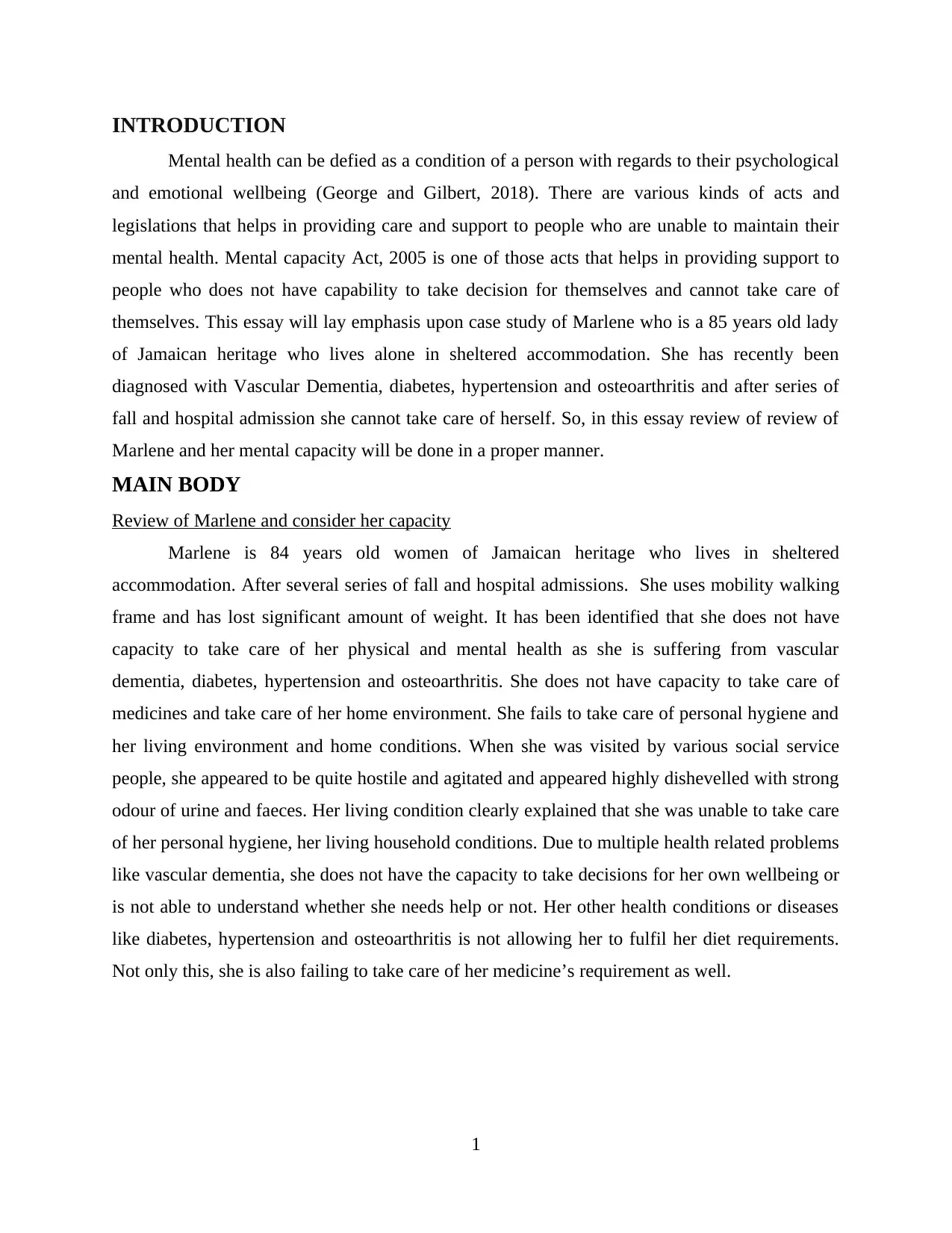
INTRODUCTION
Mental health can be defied as a condition of a person with regards to their psychological
and emotional wellbeing (George and Gilbert, 2018). There are various kinds of acts and
legislations that helps in providing care and support to people who are unable to maintain their
mental health. Mental capacity Act, 2005 is one of those acts that helps in providing support to
people who does not have capability to take decision for themselves and cannot take care of
themselves. This essay will lay emphasis upon case study of Marlene who is a 85 years old lady
of Jamaican heritage who lives alone in sheltered accommodation. She has recently been
diagnosed with Vascular Dementia, diabetes, hypertension and osteoarthritis and after series of
fall and hospital admission she cannot take care of herself. So, in this essay review of review of
Marlene and her mental capacity will be done in a proper manner.
MAIN BODY
Review of Marlene and consider her capacity
Marlene is 84 years old women of Jamaican heritage who lives in sheltered
accommodation. After several series of fall and hospital admissions. She uses mobility walking
frame and has lost significant amount of weight. It has been identified that she does not have
capacity to take care of her physical and mental health as she is suffering from vascular
dementia, diabetes, hypertension and osteoarthritis. She does not have capacity to take care of
medicines and take care of her home environment. She fails to take care of personal hygiene and
her living environment and home conditions. When she was visited by various social service
people, she appeared to be quite hostile and agitated and appeared highly dishevelled with strong
odour of urine and faeces. Her living condition clearly explained that she was unable to take care
of her personal hygiene, her living household conditions. Due to multiple health related problems
like vascular dementia, she does not have the capacity to take decisions for her own wellbeing or
is not able to understand whether she needs help or not. Her other health conditions or diseases
like diabetes, hypertension and osteoarthritis is not allowing her to fulfil her diet requirements.
Not only this, she is also failing to take care of her medicine’s requirement as well.
1
Mental health can be defied as a condition of a person with regards to their psychological
and emotional wellbeing (George and Gilbert, 2018). There are various kinds of acts and
legislations that helps in providing care and support to people who are unable to maintain their
mental health. Mental capacity Act, 2005 is one of those acts that helps in providing support to
people who does not have capability to take decision for themselves and cannot take care of
themselves. This essay will lay emphasis upon case study of Marlene who is a 85 years old lady
of Jamaican heritage who lives alone in sheltered accommodation. She has recently been
diagnosed with Vascular Dementia, diabetes, hypertension and osteoarthritis and after series of
fall and hospital admission she cannot take care of herself. So, in this essay review of review of
Marlene and her mental capacity will be done in a proper manner.
MAIN BODY
Review of Marlene and consider her capacity
Marlene is 84 years old women of Jamaican heritage who lives in sheltered
accommodation. After several series of fall and hospital admissions. She uses mobility walking
frame and has lost significant amount of weight. It has been identified that she does not have
capacity to take care of her physical and mental health as she is suffering from vascular
dementia, diabetes, hypertension and osteoarthritis. She does not have capacity to take care of
medicines and take care of her home environment. She fails to take care of personal hygiene and
her living environment and home conditions. When she was visited by various social service
people, she appeared to be quite hostile and agitated and appeared highly dishevelled with strong
odour of urine and faeces. Her living condition clearly explained that she was unable to take care
of her personal hygiene, her living household conditions. Due to multiple health related problems
like vascular dementia, she does not have the capacity to take decisions for her own wellbeing or
is not able to understand whether she needs help or not. Her other health conditions or diseases
like diabetes, hypertension and osteoarthritis is not allowing her to fulfil her diet requirements.
Not only this, she is also failing to take care of her medicine’s requirement as well.
1
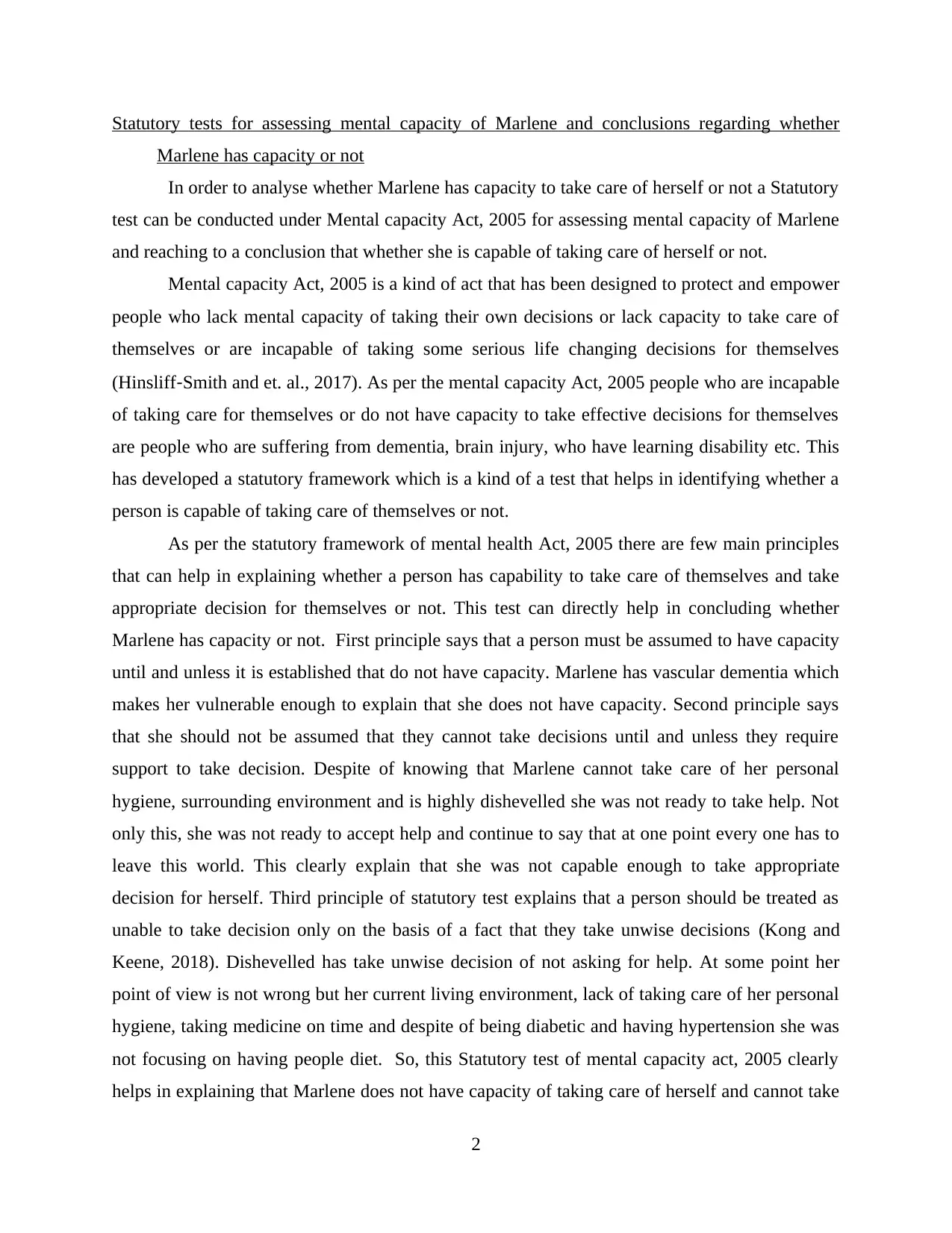
Statutory tests for assessing mental capacity of Marlene and conclusions regarding whether
Marlene has capacity or not
In order to analyse whether Marlene has capacity to take care of herself or not a Statutory
test can be conducted under Mental capacity Act, 2005 for assessing mental capacity of Marlene
and reaching to a conclusion that whether she is capable of taking care of herself or not.
Mental capacity Act, 2005 is a kind of act that has been designed to protect and empower
people who lack mental capacity of taking their own decisions or lack capacity to take care of
themselves or are incapable of taking some serious life changing decisions for themselves
(Hinsliff‐Smith and et. al., 2017). As per the mental capacity Act, 2005 people who are incapable
of taking care for themselves or do not have capacity to take effective decisions for themselves
are people who are suffering from dementia, brain injury, who have learning disability etc. This
has developed a statutory framework which is a kind of a test that helps in identifying whether a
person is capable of taking care of themselves or not.
As per the statutory framework of mental health Act, 2005 there are few main principles
that can help in explaining whether a person has capability to take care of themselves and take
appropriate decision for themselves or not. This test can directly help in concluding whether
Marlene has capacity or not. First principle says that a person must be assumed to have capacity
until and unless it is established that do not have capacity. Marlene has vascular dementia which
makes her vulnerable enough to explain that she does not have capacity. Second principle says
that she should not be assumed that they cannot take decisions until and unless they require
support to take decision. Despite of knowing that Marlene cannot take care of her personal
hygiene, surrounding environment and is highly dishevelled she was not ready to take help. Not
only this, she was not ready to accept help and continue to say that at one point every one has to
leave this world. This clearly explain that she was not capable enough to take appropriate
decision for herself. Third principle of statutory test explains that a person should be treated as
unable to take decision only on the basis of a fact that they take unwise decisions (Kong and
Keene, 2018). Dishevelled has take unwise decision of not asking for help. At some point her
point of view is not wrong but her current living environment, lack of taking care of her personal
hygiene, taking medicine on time and despite of being diabetic and having hypertension she was
not focusing on having people diet. So, this Statutory test of mental capacity act, 2005 clearly
helps in explaining that Marlene does not have capacity of taking care of herself and cannot take
2
Marlene has capacity or not
In order to analyse whether Marlene has capacity to take care of herself or not a Statutory
test can be conducted under Mental capacity Act, 2005 for assessing mental capacity of Marlene
and reaching to a conclusion that whether she is capable of taking care of herself or not.
Mental capacity Act, 2005 is a kind of act that has been designed to protect and empower
people who lack mental capacity of taking their own decisions or lack capacity to take care of
themselves or are incapable of taking some serious life changing decisions for themselves
(Hinsliff‐Smith and et. al., 2017). As per the mental capacity Act, 2005 people who are incapable
of taking care for themselves or do not have capacity to take effective decisions for themselves
are people who are suffering from dementia, brain injury, who have learning disability etc. This
has developed a statutory framework which is a kind of a test that helps in identifying whether a
person is capable of taking care of themselves or not.
As per the statutory framework of mental health Act, 2005 there are few main principles
that can help in explaining whether a person has capability to take care of themselves and take
appropriate decision for themselves or not. This test can directly help in concluding whether
Marlene has capacity or not. First principle says that a person must be assumed to have capacity
until and unless it is established that do not have capacity. Marlene has vascular dementia which
makes her vulnerable enough to explain that she does not have capacity. Second principle says
that she should not be assumed that they cannot take decisions until and unless they require
support to take decision. Despite of knowing that Marlene cannot take care of her personal
hygiene, surrounding environment and is highly dishevelled she was not ready to take help. Not
only this, she was not ready to accept help and continue to say that at one point every one has to
leave this world. This clearly explain that she was not capable enough to take appropriate
decision for herself. Third principle of statutory test explains that a person should be treated as
unable to take decision only on the basis of a fact that they take unwise decisions (Kong and
Keene, 2018). Dishevelled has take unwise decision of not asking for help. At some point her
point of view is not wrong but her current living environment, lack of taking care of her personal
hygiene, taking medicine on time and despite of being diabetic and having hypertension she was
not focusing on having people diet. So, this Statutory test of mental capacity act, 2005 clearly
helps in explaining that Marlene does not have capacity of taking care of herself and cannot take
2
Secure Best Marks with AI Grader
Need help grading? Try our AI Grader for instant feedback on your assignments.
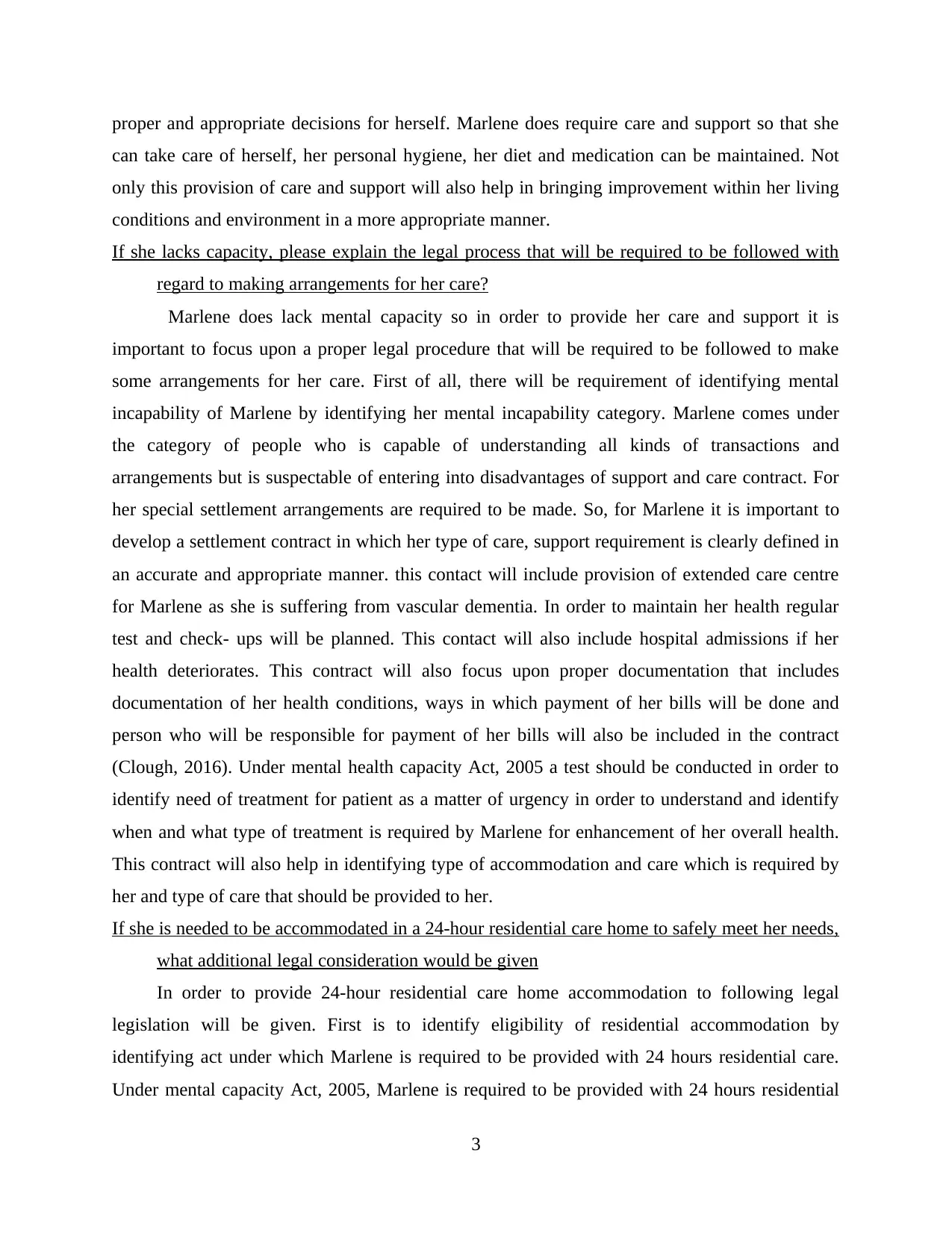
proper and appropriate decisions for herself. Marlene does require care and support so that she
can take care of herself, her personal hygiene, her diet and medication can be maintained. Not
only this provision of care and support will also help in bringing improvement within her living
conditions and environment in a more appropriate manner.
If she lacks capacity, please explain the legal process that will be required to be followed with
regard to making arrangements for her care?
Marlene does lack mental capacity so in order to provide her care and support it is
important to focus upon a proper legal procedure that will be required to be followed to make
some arrangements for her care. First of all, there will be requirement of identifying mental
incapability of Marlene by identifying her mental incapability category. Marlene comes under
the category of people who is capable of understanding all kinds of transactions and
arrangements but is suspectable of entering into disadvantages of support and care contract. For
her special settlement arrangements are required to be made. So, for Marlene it is important to
develop a settlement contract in which her type of care, support requirement is clearly defined in
an accurate and appropriate manner. this contact will include provision of extended care centre
for Marlene as she is suffering from vascular dementia. In order to maintain her health regular
test and check- ups will be planned. This contact will also include hospital admissions if her
health deteriorates. This contract will also focus upon proper documentation that includes
documentation of her health conditions, ways in which payment of her bills will be done and
person who will be responsible for payment of her bills will also be included in the contract
(Clough, 2016). Under mental health capacity Act, 2005 a test should be conducted in order to
identify need of treatment for patient as a matter of urgency in order to understand and identify
when and what type of treatment is required by Marlene for enhancement of her overall health.
This contract will also help in identifying type of accommodation and care which is required by
her and type of care that should be provided to her.
If she is needed to be accommodated in a 24-hour residential care home to safely meet her needs,
what additional legal consideration would be given
In order to provide 24-hour residential care home accommodation to following legal
legislation will be given. First is to identify eligibility of residential accommodation by
identifying act under which Marlene is required to be provided with 24 hours residential care.
Under mental capacity Act, 2005, Marlene is required to be provided with 24 hours residential
3
can take care of herself, her personal hygiene, her diet and medication can be maintained. Not
only this provision of care and support will also help in bringing improvement within her living
conditions and environment in a more appropriate manner.
If she lacks capacity, please explain the legal process that will be required to be followed with
regard to making arrangements for her care?
Marlene does lack mental capacity so in order to provide her care and support it is
important to focus upon a proper legal procedure that will be required to be followed to make
some arrangements for her care. First of all, there will be requirement of identifying mental
incapability of Marlene by identifying her mental incapability category. Marlene comes under
the category of people who is capable of understanding all kinds of transactions and
arrangements but is suspectable of entering into disadvantages of support and care contract. For
her special settlement arrangements are required to be made. So, for Marlene it is important to
develop a settlement contract in which her type of care, support requirement is clearly defined in
an accurate and appropriate manner. this contact will include provision of extended care centre
for Marlene as she is suffering from vascular dementia. In order to maintain her health regular
test and check- ups will be planned. This contact will also include hospital admissions if her
health deteriorates. This contract will also focus upon proper documentation that includes
documentation of her health conditions, ways in which payment of her bills will be done and
person who will be responsible for payment of her bills will also be included in the contract
(Clough, 2016). Under mental health capacity Act, 2005 a test should be conducted in order to
identify need of treatment for patient as a matter of urgency in order to understand and identify
when and what type of treatment is required by Marlene for enhancement of her overall health.
This contract will also help in identifying type of accommodation and care which is required by
her and type of care that should be provided to her.
If she is needed to be accommodated in a 24-hour residential care home to safely meet her needs,
what additional legal consideration would be given
In order to provide 24-hour residential care home accommodation to following legal
legislation will be given. First is to identify eligibility of residential accommodation by
identifying act under which Marlene is required to be provided with 24 hours residential care.
Under mental capacity Act, 2005, Marlene is required to be provided with 24 hours residential
3
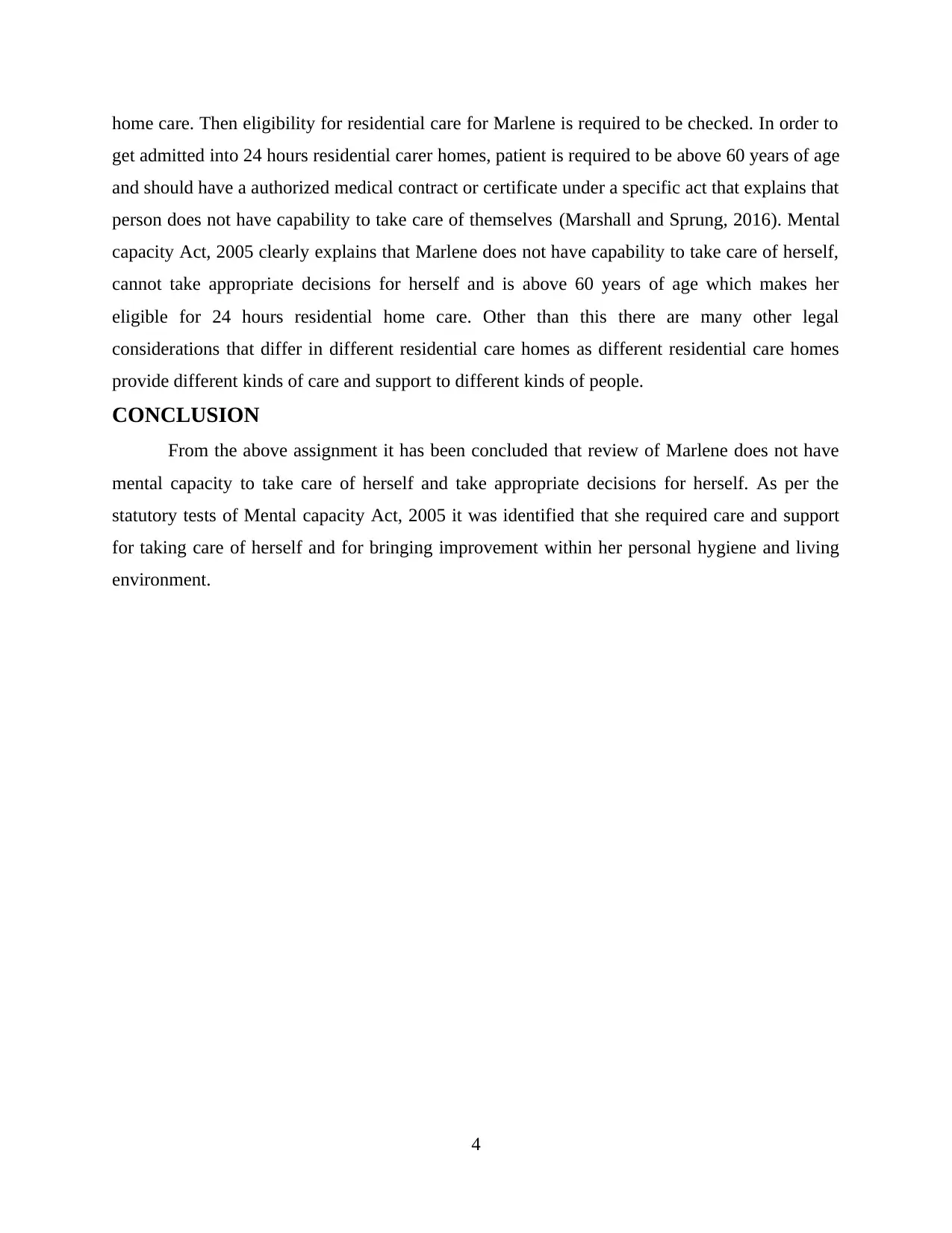
home care. Then eligibility for residential care for Marlene is required to be checked. In order to
get admitted into 24 hours residential carer homes, patient is required to be above 60 years of age
and should have a authorized medical contract or certificate under a specific act that explains that
person does not have capability to take care of themselves (Marshall and Sprung, 2016). Mental
capacity Act, 2005 clearly explains that Marlene does not have capability to take care of herself,
cannot take appropriate decisions for herself and is above 60 years of age which makes her
eligible for 24 hours residential home care. Other than this there are many other legal
considerations that differ in different residential care homes as different residential care homes
provide different kinds of care and support to different kinds of people.
CONCLUSION
From the above assignment it has been concluded that review of Marlene does not have
mental capacity to take care of herself and take appropriate decisions for herself. As per the
statutory tests of Mental capacity Act, 2005 it was identified that she required care and support
for taking care of herself and for bringing improvement within her personal hygiene and living
environment.
4
get admitted into 24 hours residential carer homes, patient is required to be above 60 years of age
and should have a authorized medical contract or certificate under a specific act that explains that
person does not have capability to take care of themselves (Marshall and Sprung, 2016). Mental
capacity Act, 2005 clearly explains that Marlene does not have capability to take care of herself,
cannot take appropriate decisions for herself and is above 60 years of age which makes her
eligible for 24 hours residential home care. Other than this there are many other legal
considerations that differ in different residential care homes as different residential care homes
provide different kinds of care and support to different kinds of people.
CONCLUSION
From the above assignment it has been concluded that review of Marlene does not have
mental capacity to take care of herself and take appropriate decisions for herself. As per the
statutory tests of Mental capacity Act, 2005 it was identified that she required care and support
for taking care of herself and for bringing improvement within her personal hygiene and living
environment.
4
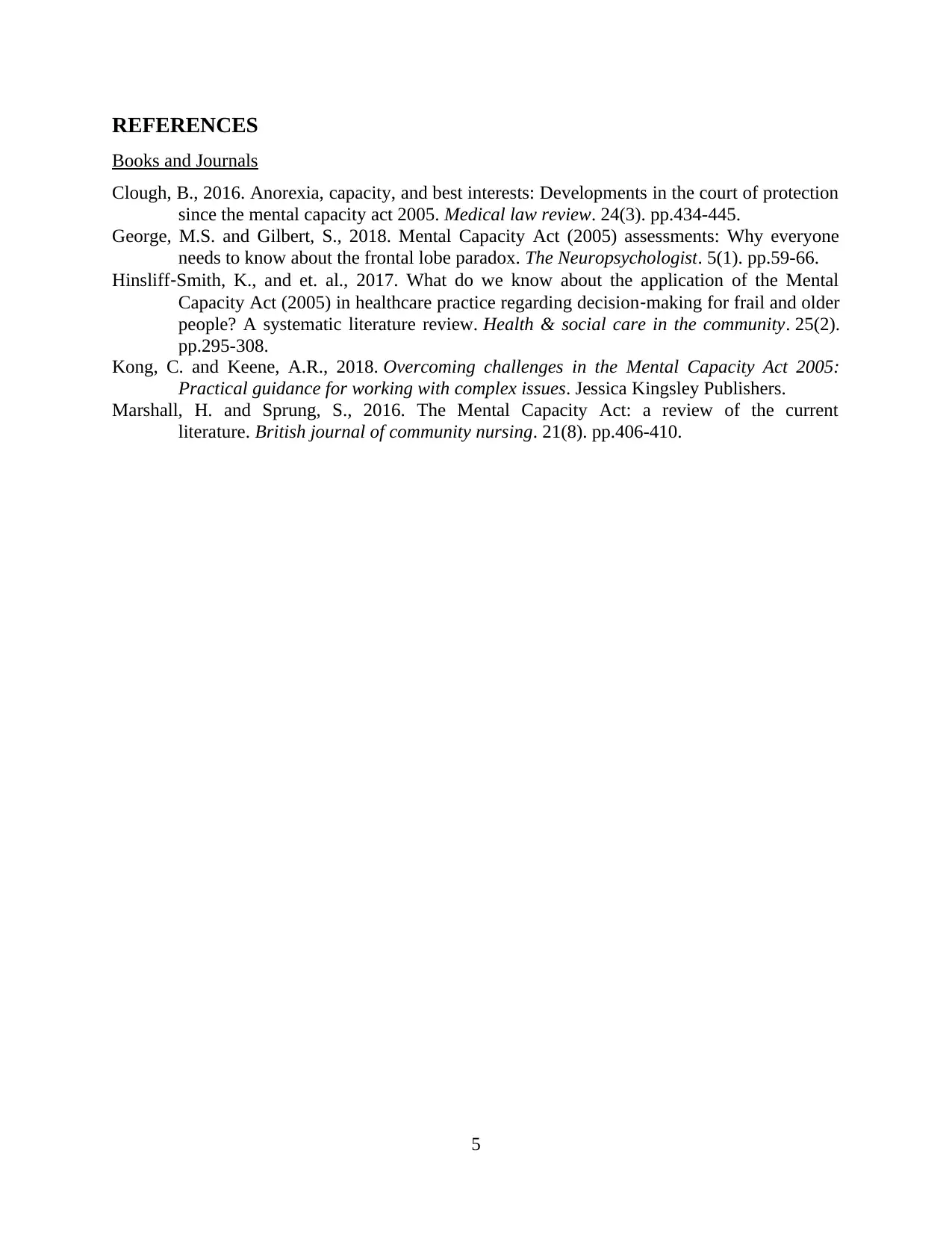
REFERENCES
Books and Journals
Clough, B., 2016. Anorexia, capacity, and best interests: Developments in the court of protection
since the mental capacity act 2005. Medical law review. 24(3). pp.434-445.
George, M.S. and Gilbert, S., 2018. Mental Capacity Act (2005) assessments: Why everyone
needs to know about the frontal lobe paradox. The Neuropsychologist. 5(1). pp.59-66.
Hinsliff‐Smith, K., and et. al., 2017. What do we know about the application of the Mental
Capacity Act (2005) in healthcare practice regarding decision‐making for frail and older
people? A systematic literature review. Health & social care in the community. 25(2).
pp.295-308.
Kong, C. and Keene, A.R., 2018. Overcoming challenges in the Mental Capacity Act 2005:
Practical guidance for working with complex issues. Jessica Kingsley Publishers.
Marshall, H. and Sprung, S., 2016. The Mental Capacity Act: a review of the current
literature. British journal of community nursing. 21(8). pp.406-410.
5
Books and Journals
Clough, B., 2016. Anorexia, capacity, and best interests: Developments in the court of protection
since the mental capacity act 2005. Medical law review. 24(3). pp.434-445.
George, M.S. and Gilbert, S., 2018. Mental Capacity Act (2005) assessments: Why everyone
needs to know about the frontal lobe paradox. The Neuropsychologist. 5(1). pp.59-66.
Hinsliff‐Smith, K., and et. al., 2017. What do we know about the application of the Mental
Capacity Act (2005) in healthcare practice regarding decision‐making for frail and older
people? A systematic literature review. Health & social care in the community. 25(2).
pp.295-308.
Kong, C. and Keene, A.R., 2018. Overcoming challenges in the Mental Capacity Act 2005:
Practical guidance for working with complex issues. Jessica Kingsley Publishers.
Marshall, H. and Sprung, S., 2016. The Mental Capacity Act: a review of the current
literature. British journal of community nursing. 21(8). pp.406-410.
5
1 out of 7
Related Documents
Your All-in-One AI-Powered Toolkit for Academic Success.
+13062052269
info@desklib.com
Available 24*7 on WhatsApp / Email
![[object Object]](/_next/static/media/star-bottom.7253800d.svg)
Unlock your academic potential
© 2024 | Zucol Services PVT LTD | All rights reserved.



